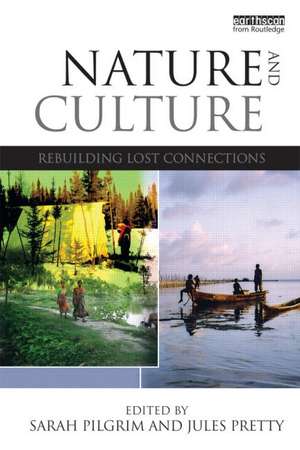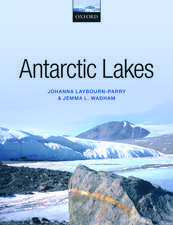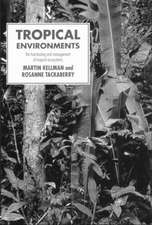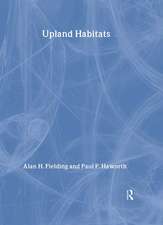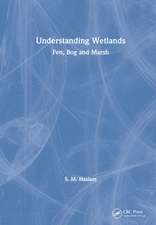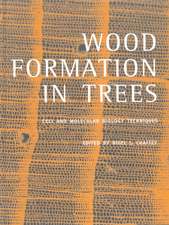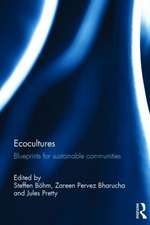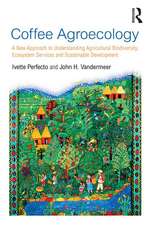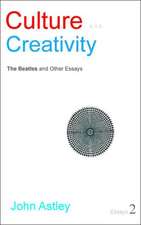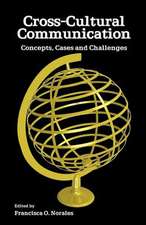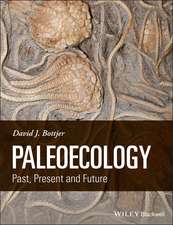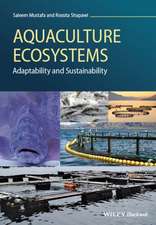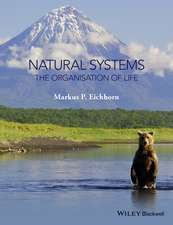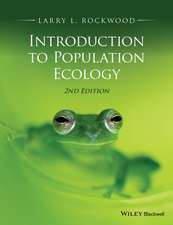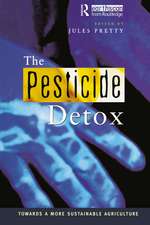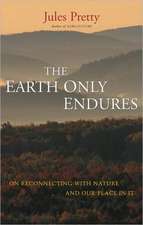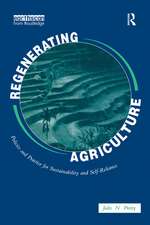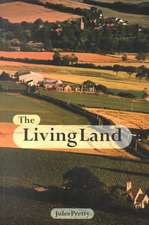Nature and Culture: Rebuilding Lost Connections
Editat de Sarah Pilgrim, Jules N. Prettyen Limba Engleză Paperback – 16 ian 2013
This book goes beyond divisive definitions and investigates the bridges linking biological and cultural diversity. The international team of authors explore the common drivers of loss, and argue that policy responses should target both forms of diversity in a novel integrative approach to conservation, thus reducing the gap between science, policy and practice. While conserving nature alongside human cultures presents unique challenges, this book forcefully shows that any hope for saving biological diversity is predicated on a concomitant effort to appreciate and protect cultural diversity.
| Toate formatele și edițiile | Preț | Express |
|---|---|---|
| Paperback (1) | 459.05 lei 6-8 săpt. | |
| Taylor & Francis – 16 ian 2013 | 459.05 lei 6-8 săpt. | |
| Hardback (1) | 1009.21 lei 6-8 săpt. | |
| Taylor & Francis – 14 iul 2010 | 1009.21 lei 6-8 săpt. |
Preț: 459.05 lei
Nou
Puncte Express: 689
Preț estimativ în valută:
87.85€ • 95.39$ • 73.79£
87.85€ • 95.39$ • 73.79£
Carte tipărită la comandă
Livrare economică 22 aprilie-06 mai
Preluare comenzi: 021 569.72.76
Specificații
ISBN-13: 9780415813549
ISBN-10: 0415813549
Pagini: 296
Dimensiuni: 156 x 234 x 20 mm
Greutate: 0.68 kg
Ediția:1
Editura: Taylor & Francis
Colecția Routledge
Locul publicării:Oxford, United Kingdom
ISBN-10: 0415813549
Pagini: 296
Dimensiuni: 156 x 234 x 20 mm
Greutate: 0.68 kg
Ediția:1
Editura: Taylor & Francis
Colecția Routledge
Locul publicării:Oxford, United Kingdom
Cuprins
1. Nature and Culture: An Introduction Part 1: Science in Practice 2. Bridging the Gap: Interdisciplinarity, Biocultural Diversity and Conservation 3. Measuring Status and Trends in Biological and Cultural Diversity Part 2: Landscape and Diversity 4. No Land Apart: Nature, Culture, Landscape 5. From Colonial Encounter to Decolonizing Encounters. Culture and Nature seen from the Andean Cosmovision of Ever: the Nurturance of Life as Whole 6. The Dual Erosion of Biological and Cultural Diversity: Implications for the Health of Eco-Cultural Systems Part 3: Hunting 7. Biodiversity and Cultural Diversity: The Interdependent and the Indistinguishable 8. Challenging Animals: Project and Process in Hunting Part 4: Agriculture 9. Culture and Agrobiodiversity: Understanding the Links 10. Food Cultures: Linking People to Landscapes Part 5: Reconnection 11. Sacred Nature and Community Conserved Areas 12. Solastalgia and the Creation of New Ways of Living 13. EcoCultural Revitalisation: Replenishing Community Connections to the Land 14. Nature and Culture: Looking to the Future for Human-Environment Systems Index
Notă biografică
Sarah Pilgrim is a Senior Research Officer at the Centre for Environment and Society, University of Essex, UK. Her areas of interest include indigenous and local knowledge systems, community resource management and cultural revitalisation. Her geographic expertise includes the Indo-Pacific, southern India and Arctic and sub-Arctic environments.
Jules Pretty OBE is Professor of Environment and Society in the Department of Biological Sciences at the University of Essex, UK, and Chief Editor of the International Journal of Agricultural Sustainability. His works include The Earth Only Endures (2007), The Earthscan Reader in Sustainable Agriculture (2005), The Pesticide Detox (2005), Agri-Culture (2002), The Living Land (1998), Regenerating Agriculture (1995), The Hidden Harvest (1992) and Unwelcome Harvest (1991).
Jules Pretty OBE is Professor of Environment and Society in the Department of Biological Sciences at the University of Essex, UK, and Chief Editor of the International Journal of Agricultural Sustainability. His works include The Earth Only Endures (2007), The Earthscan Reader in Sustainable Agriculture (2005), The Pesticide Detox (2005), Agri-Culture (2002), The Living Land (1998), Regenerating Agriculture (1995), The Hidden Harvest (1992) and Unwelcome Harvest (1991).
Recenzii
'This richly textured book tells vitally important stories about how indigenous cultures are closely tied to the ecosystems they inhabit. As their societies are harassed by encroaching and usually hostile forces, those close links are being stretched and broken. Quite apart from their right to continue to live as they choose, there is much we can learn from them about how to live in harmony with nature. Indeed, our very existence may depend upon our recognizing this.' – Robin Hanbury-Tenison OBE, President, Survival International
'People have been considered separate from nature for far too long, and this book provides a welcome antidote. With a group of experienced contributors, it provides a kaleidoscope of the unity of people with the rest of nature. These perspectives have immediate application for anyone seeking a more sustainable future for both biological and cultural diversity, which this book shows to be part of the same unity.' – Dr Jeffrey A. McNeely, Senior Science Advisor, IUCN
'This fascinating, insightful book brings together an array of distinguished scholars highlighting the inter-connectedness of humans and nature which underpins social, ecological and cultural resilience in the face of current global crises. An outstanding and original contribution to sustainability science.' – Professor Katrina Brown, School of International Development, University of East Anglia, UK
'Nature and Culture is an inspiring and deeply informative collection that probes nature/culture interconnections in fascinating international cases. It revitalizes and refines our commitment to a new paradigm for human relations with the earth. A gem of a book.' – Professor Peggy F. Barlett, Goodrich C. White Professor of Anthropology, Emory University, USA
'This collection provides a glimpse of paradise re-gained, when our mis-judged separation from and ambition to master Nature can be repaired. If we are to survive and prosper in the decades to come, we must knit ourselves back into the web of life, recognising the resilience which stems from investing in diverse social, dietary and eco-systems.' – Dr Camilla Toulmin, Director, International Institute for Environment and Development
'Nature and Culture moves beyond dichotomies and boundaries, bringing together philosophical, linguistic, socio-cultural, biological, and agricultural livelihood perspectives to document the inextricable co-evolution of ecosystems and cultures. Whether it is through the sacred cosmologies that shape and maintain mosaic landscapes, or the food cultures that promote health and sustainable diets, or the languages that encode our diverse interactions with nature, the authors provide pathways to reconnect people with ecosystems to ensure their resilience and prospects for improving human welfare. This book belongs on the desk of all concerned with improving the ways we manage our social and ecological systems to sustain life.' – Dr Pablo B. Eyzaguirre, Senior Scientist, Bioversity International
'A vitally important book for our time... Essential.' – CHOICE, July 2011
"The major objective of this book is to describe the interconnections that exist between humans and the natural environment in different contexts… This book is written with a considerable level of detail… It is well referenced and has an adequate index." Carol M. Duffus, Expl Agric
'People have been considered separate from nature for far too long, and this book provides a welcome antidote. With a group of experienced contributors, it provides a kaleidoscope of the unity of people with the rest of nature. These perspectives have immediate application for anyone seeking a more sustainable future for both biological and cultural diversity, which this book shows to be part of the same unity.' – Dr Jeffrey A. McNeely, Senior Science Advisor, IUCN
'This fascinating, insightful book brings together an array of distinguished scholars highlighting the inter-connectedness of humans and nature which underpins social, ecological and cultural resilience in the face of current global crises. An outstanding and original contribution to sustainability science.' – Professor Katrina Brown, School of International Development, University of East Anglia, UK
'Nature and Culture is an inspiring and deeply informative collection that probes nature/culture interconnections in fascinating international cases. It revitalizes and refines our commitment to a new paradigm for human relations with the earth. A gem of a book.' – Professor Peggy F. Barlett, Goodrich C. White Professor of Anthropology, Emory University, USA
'This collection provides a glimpse of paradise re-gained, when our mis-judged separation from and ambition to master Nature can be repaired. If we are to survive and prosper in the decades to come, we must knit ourselves back into the web of life, recognising the resilience which stems from investing in diverse social, dietary and eco-systems.' – Dr Camilla Toulmin, Director, International Institute for Environment and Development
'Nature and Culture moves beyond dichotomies and boundaries, bringing together philosophical, linguistic, socio-cultural, biological, and agricultural livelihood perspectives to document the inextricable co-evolution of ecosystems and cultures. Whether it is through the sacred cosmologies that shape and maintain mosaic landscapes, or the food cultures that promote health and sustainable diets, or the languages that encode our diverse interactions with nature, the authors provide pathways to reconnect people with ecosystems to ensure their resilience and prospects for improving human welfare. This book belongs on the desk of all concerned with improving the ways we manage our social and ecological systems to sustain life.' – Dr Pablo B. Eyzaguirre, Senior Scientist, Bioversity International
'A vitally important book for our time... Essential.' – CHOICE, July 2011
"The major objective of this book is to describe the interconnections that exist between humans and the natural environment in different contexts… This book is written with a considerable level of detail… It is well referenced and has an adequate index." Carol M. Duffus, Expl Agric
Descriere
This book goes beyond divisive definitions and investigates the bridges linking biological and cultural diversity. The international team of authors explore the common drivers of loss, and argue that policy responses should target both forms of diversity in a novel integrative approach to conservation, thus reducing the gap between science, policy and practice.
